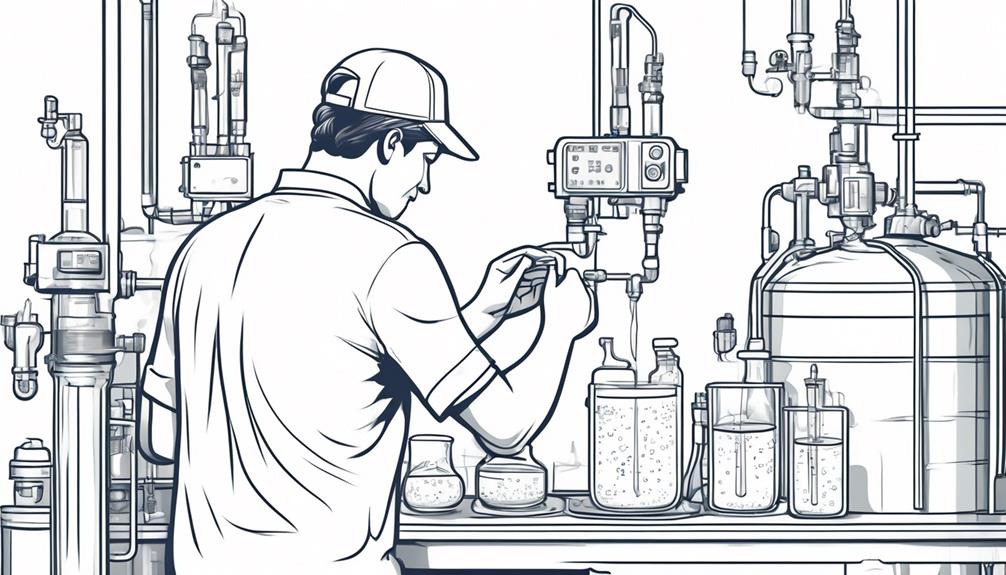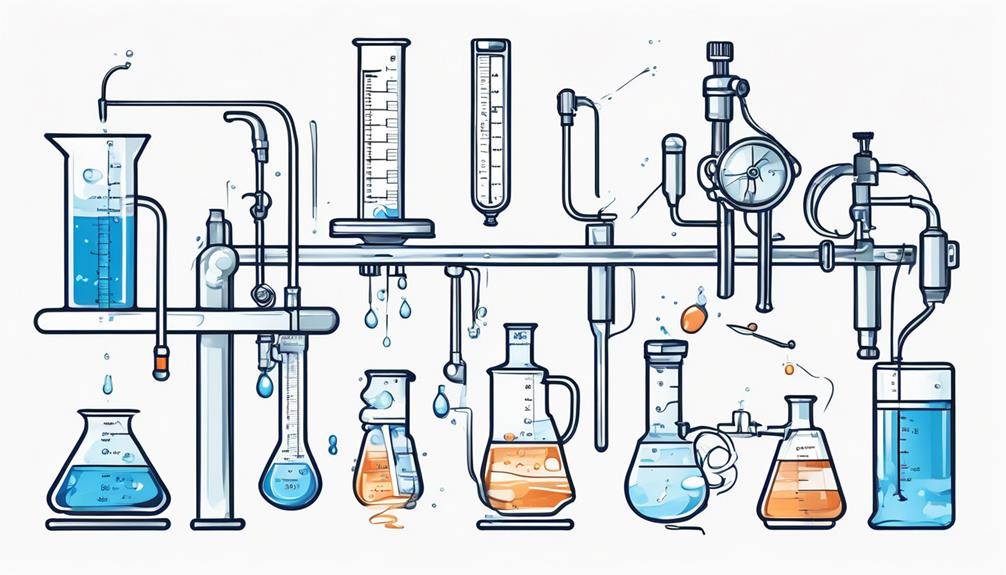Imagine water as the silent architect behind the curtain, shaping the very essence of your favorite brews. Water chemistry in brewing is like the secret ingredient that can make or break your beer experience. From the mineral content to the pH levels, every aspect of water plays a crucial role in crafting that perfect pint.
So, why does water chemistry matter so much in brewing? Stay tuned to uncover the hidden science that transforms a simple concoction into a symphony of flavors and aromas that tantalize your taste buds like never before.
Key Takeaways
- Water chemistry is essential for creating high-quality beer, impacting flavor, yeast health, and starch conversion during the brewing process.
- Maintaining an optimal pH level between 5.2 and 5.6 is critical for enhancing mash efficiency, yeast activity, and flavor extraction.
- Alkalinity plays a vital role in buffering pH levels and supporting yeast performance, influencing fermentation success.
- Balancing mineral composition and alkalinity in brewing water is necessary to stabilize pH, counter acidity from ingredients, and enhance overall beer quality.
Importance of Water Chemistry in Brewing
Understanding water chemistry is vital for crafting high-quality, flavorful beer. Brewing water chemistry plays a crucial role in the pH levels during the mash process, affecting starch conversion, yeast health, and flavor extraction.
The mineral composition of water, including calcium, magnesium, sulfate, chloride, and sodium, directly impacts enzyme activity, hop bitterness, and overall beer flavor. By carefully balancing these ions and adjusting mineral ratios, brewers can enhance specific beer styles to achieve desired characteristics.
For example, higher sulfate levels can accentuate hop bitterness in IPAs, while increased chloride can contribute to a rounder mouthfeel in stouts.
Managing water profiles through testing and adjustments is essential for ensuring that the brewing process optimally supports yeast metabolism and the development of complex flavors in the final beer product.
Mastering water chemistry empowers brewers to create exceptional beers that stand out for their distinct taste and quality.
Role of Ph in Brewing Water
Hey, brewer! Ever wonder why pH is crucial in brewing water?
Well, it directly impacts flavor, yeast activity, and mash efficiency.
Keep an eye on that pH level to achieve the perfect balance for your tasty, high-quality brew.
Ph Impact on Flavor
Influencing enzymatic activity and yeast health, the pH of your brewing water plays a crucial role in shaping the flavor profile of your beer. To optimize flavor and mouthfeel, consider these key points:
- Maintaining Mash pH: Keep your mash pH between 5.2 and 5.6 for proper starch conversion and flavor extraction.
- Balancing Alkalinity: Alkalinity acts as a buffer to pH levels and impacts the brewing process.
- Fine-Tuning with Adjustments: Adjusting pH using brewing salts like calcium chloride or acid additions can enhance the overall quality and characteristics of your beer.
Using a pH meter to monitor and adjust your water profile will help ensure yeast health and improve the final taste of your brew.
Yeast Activity and Ph
To enhance the activity of yeast in your brewing process, maintaining the proper pH levels in your water is essential for optimal fermentation and flavor development. Water chemistry, including pH, plays a crucial role in influencing yeast activity.
pH impacts yeast health, flavor extraction, and starch conversion during brewing. Alkalinity, which acts as a buffer to pH levels, directly affects yeast performance.
Balancing pH levels in your brewing water is key to facilitating yeast activity and fermentation. Utilizing tools like pH meters and brewing software can help you monitor and adjust the pH of your water to create ideal brewing conditions.
Mash Efficiency and Ph
Achieving optimal mash efficiency in brewing hinges on maintaining the pH level of your brewing water within the ideal range. Here are some key points to consider:
- Water Chemistry: Understanding your water profile is crucial for adjusting pH levels.
- Mash Efficiency: Maintaining a mash pH of 5.2 to 5.6 is essential for maximizing efficiency.
- Acid Adjustment: Using acids like lactic acid or phosphoric acid can help fine-tune your water pH for better results.
Understanding Alkalinity in Brewing
Alright, let's talk about alkalinity in brewing!
Picture alkalinity as your brewing water's guardian of pH stability. It helps keep things in balance for starch conversion, yeast happiness, and flavor magic.
Ever wondered how to hit that sweet mash pH spot? Alkalinity's got your back!
Alkalinity Impact on Ph
Alkalinity in brewing serves as a vital regulator of pH levels, ensuring the optimal balance for a successful brewing process. When it comes to the impact of alkalinity on pH in brewing, understanding this relationship is key to achieving the desired outcomes.
- Buffering Effect: Alkalinity acts as a buffer, helping to stabilize pH levels during the brewing process.
- Acid Neutralization: Alkalinity can counteract the acidity introduced by ingredients like dark malts, ensuring the mash pH remains within the desired range.
- Optimal Mash pH: Maintaining the right alkalinity level in your water profile is crucial for achieving the correct mash pH, which impacts starch conversion and overall flavor extraction in your beer.
Managing Alkalinity Levels
Understanding the role of alkalinity in brewing is essential for managing pH levels effectively and ensuring successful beer production. Alkalinity, a key component of water chemistry, acts as a buffer impacting mash pH, starch conversion, yeast health, and flavor extraction.
To control alkalinity levels, brewers can adjust their water profile using brewing salts like calcium chloride, or acids such as lactic or phosphoric acid. This balancing act is crucial for maintaining mash pH between 5.2 and 5.6, especially in all-grain brewing.
Factors like water sources, RO water, and the use of a water calculator play a significant role in determining alkalinity levels and overall beer quality. Mastering alkalinity management is vital for enhancing the brewing process and achieving desired beer characteristics.
Significance of Sulfate and Chloride

With sulfate and chloride levels being crucial factors in brewing water, their impact on beer flavor and mouthfeel can't be overstated. When considering water chemistry for brewing, understanding the significance of sulfate and chloride is essential for achieving the desired beer profiles. Here's why they matter:
- Sulfate: Enhances hop bitterness and accentuates dryness in beer, making it ideal for styles like IPAs that rely on a pronounced hop character.
- Chloride: Contributes to sweetness and roundness in beer, enhancing malt flavors and making it suitable for styles like malty stouts or porters.
- Balancing Ratio: Maintaining the sulfate-to-chloride ratio is crucial in creating a harmonious balance between hop bitterness and malt sweetness, ensuring a well-rounded beer profile.
Impact of Brewing Minerals
Water minerals play a crucial role in shaping the taste and mouthfeel of your beer. The composition of your water, known as the water profile, directly affects the brewing process. Minerals like calcium, magnesium, sodium, sulfate, and chloride impact various aspects such as bitterness, mouthfeel, and overall flavor.
Adjusting the levels of sulfate and chloride can significantly influence these characteristics in your beer. Brewing software can assist in precisely adjusting the water minerals to suit specific beer styles. Commonly used salts like Epsom salt, gypsum, calcium chloride, table salt, and baking soda are employed for these adjustments. Accurate measurement using scales is vital when adding these salts to ensure precise control over the brewing process.
Understanding your water report, considering methods like reverse osmosis, and even controlling carbon dioxide levels all contribute to manipulating the mineral content for optimal mash pH and desirable beer outcomes.
Improving Brewing Process With Water

To enhance your brewing process, consider the impact of water chemistry on your beer's taste and quality. Making adjustments to your water profile can greatly improve your final product. Here are some ways to optimize your brewing process with water chemistry:
- Maintain the Right Mineral Balance: Adjust the levels of key minerals like calcium, sulfate, and chloride to achieve the optimal sulphate to chloride ratio for your beer style.
- Control Mash pH: Use brewing salts such as gypsum and calcium chloride to adjust the alkalinity of your water and ensure a mash pH of around 5.2-5.6 for optimal enzyme activity.
- Consider RO Water: If your tap water isn't ideal for brewing, consider using Reverse Osmosis (RO) water as a blank canvas and build up the necessary mineral profile for each batch.
Utilizing Brewing Salts for Chemistry
When adjusting your brewing water chemistry, brewing salts play a crucial role in fine-tuning mineral content for specific brewing requirements. These salts, like gypsum, calcium chloride, and Epsom salt, are essential for balancing ions in the water.
By using brewing salts, you can influence critical factors such as mash pH, yeast health, and flavor extraction in your beer. Understanding the desired water profile for your targeted beer style is key when utilizing brewing salts.
Precision is vital, so make sure to use proper tools like a digital pH meter, pH calibration solutions, and a rugged carrying case for accurate adjustments. Experimenting with brewing salts and adjusting water chemistry can significantly enhance your beer's flavors and characteristics.
Tools for Water Chemistry Adjustments

Mastering the art of utilizing brewing salts not only enhances your beer's flavors but also requires essential tools for accurate adjustments to optimize water chemistry effectively. When it comes to adjusting water chemistry, having the right tools can make a significant difference in the quality of your brew. Here are some crucial tools you need:
- High-Quality Digital pH Meter: Ensures accurate readings for precise adjustments to your water chemistry.
- pH Calibration Solutions: Maintaining the accuracy of your pH meter is essential for reliable results.
- Automatic Temperature Compensation (ATC): Crucial for obtaining precise readings, especially in varying temperatures.
Utilizing these tools in conjunction with brewing salts like calcium chloride and gypsum allows you to tailor your water profile to achieve the desired mash pH, calcium levels, and alkalinity. Whether you're starting with RO water or adjusting your local water source, these tools will help you fine-tune your water chemistry for optimal brewing results.
Frequently Asked Questions
How Important Is Water Chemistry in Brewing?
Water chemistry in brewing is crucial! It impacts flavor, yeast health, and starch conversion. Balance minerals like calcium and chloride to enhance sweetness or hop character. Adjust pH for optimal results in your beer.
What Role Does Water Play in Brewing?
Water is vital in brewing, impacting flavor, yeast health, and more. Adjusting water chemistry with minerals like calcium and chloride is key. Balance ions for ideal beer styles. Your brew's taste depends on it.
How Does Water Quality Affect Beer?
Water quality directly impacts beer taste, mouthfeel, and bitterness. Adjusting minerals enhances different beer styles. Proper pH levels are crucial for enzymatic activity. Different water sources require specific adjustments. Consistent water profiles lead to desired beer characteristics.
What Is the Chemistry Behind Brewing?
Understanding the chemistry behind brewing is crucial. Key minerals like calcium and magnesium impact beer flavors. Balancing ions and adjusting water using salts like gypsum is essential for achieving desired beer profiles.
Conclusion
Now that you understand the importance of water chemistry in brewing, imagine a crystal-clear stream flowing through a lush forest, each mineral adding a unique flavor to the water.
Just like nature crafts its own perfect blend, brewers can create masterful beers by harnessing the power of water chemistry. By controlling pH levels, adjusting minerals, and using brewing salts, you can unlock a world of flavor possibilities and elevate your brewing game to new heights.
Cheers to the magic of water chemistry in brewing!